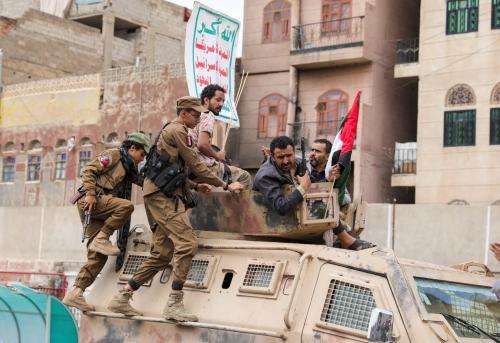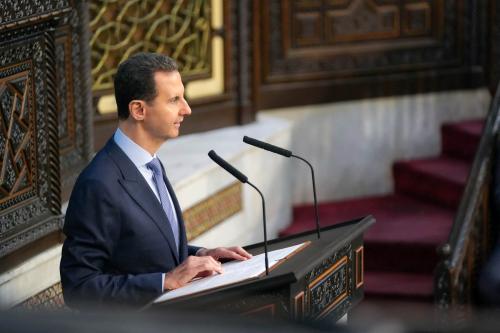In a surprise move, the Bush administration allowed the Palestinian Authority to take sole credit for U.S.-funded projects intended to help its prospects in today’s Palestinian elections. This marked a sudden reversal of a recent policy to take direct credit for development projects in the Middle East as part of a new public diplomacy effort to improve America’s image.
The impact will likely be minimal, but the strategy highlights a particular dilemma for the United States as its credibility and reputation in the Palestinian areas and the rest of the Arab world have suffered significantly: How to embrace allies without being the kiss of death.
In reality, U.S. support for the Palestinian leader, Mahmoud Abbas, is a mixed blessing. Being seen as America’s man has somewhat diminished the legitimacy of Mr. Abbas’ leadership who, despite being democratically elected, has never achieved the popular credentials of Yasser Arafat. But being America’s man can also help a political leader.
Despite the prevalent complaints about U.S. foreign policy among Palestinians, most know that Washington’s role in mediating a fair settlement to the Israeli-Palestinian conflict remains indispensable. And despite the rise of the power of the Islamic Resistance Movement, or Hamas, in the Palestinian areas, most Palestinians still prefer to see a negotiated two-state settlement.
Theoretically, a leader who can deliver an active American role that increases the chance of a sovereign viable Palestinian state should command support. The problem for Mr. Abbas is that Palestinians have seen little tangible benefit from his close relationship with the United States.
Most Palestinians saw the unilateral Israeli withdrawal from Gaza, with U.S. backing, as having little to do with Mr. Abbas. These moves were planned when Mr. Arafat was still alive, and Palestinians credit Hamas more than the PA for the Israeli withdrawal.
Moreover, the prevalent Palestinian theory about the Gaza withdrawal has been that Israel did it in order to focus on consolidating control of large segments of the West Bank. Mr. Abbas’ relationship with the United States failed to stop the recent expansion of settlements, especially around Jerusalem, raising much concern among Palestinians.
Perhaps more importantly in the short term, the failure to implement significant steps to improve conditions immediately after the withdrawal deprived Mr. Abbas of an opportunity to benefit from the pullout.
Over the past five years, economic conditions in Gaza have progressively declined, with unemployment reaching nearly 50 percent and per capita annual income declining by half to $600. Given the urgency of the situation, the vulnerability of the PA and the many months of planning for the Israeli withdrawal, it is surprising that U.S. and international programs and financial support, despite significant pledges, were not immediately put in place to give Gazans a sense of hope. In that regard, the biggest problem of the nearly $2 million U.S. program to bolster the PA is that it is too little too late.
But foreign policy is only a part of the reason for the rise of Hamas and the decline of Mr. Abbas’ Fatah party.
Much has been made of Hamas’ ability to provide social services where the PA failed, which is partly true. But there is a problem of Fatah’s own doing, akin to the problem of governing that many Third World liberation movements faced upon taking power after World War II: Their ability to fight for independence was not matched by their ability to govern.
Most of the fighters and commanders of the Palestine Liberation Organization who went to the West Bank and Gaza after the 1993 Oslo accords with Israel acted as though they were entitled to privileged political and economic positions by virtue of their past sacrifices. They did not ascend to those positions based on their ability to govern.
Issues of corruption and mismanagement became more pronounced, given that their ability to govern was even more limited than in much of the Third World because they were expected to govern as if they ruled a state without having the power of a real state. And as their power eroded, in part because of their own actions, Israel did even more to weaken their institutions after the start of the second Intifada in 2000.
Hamas will be the winner today, regardless of the actual results. It will have a significant voice in the new parliament that cannot be ignored by Mr. Abbas and the international community.
Certainly, Hamas’ power will present a challenge to renewed Israeli-Palestinian negotiations because Israel will continue to reject talking to a group that calls for its dismantlement and does not differentiate between soldier and civilian.
But, as a governing partner, Hamas will be held to a different standard: The public wants results in foreign and domestic policies, and Hamas will not be able to deliver without moderating its positions. This will undoubtedly be both a U.S. and an international demand.
In the end, one must see in the new Palestinian dynamic some healthy democratic change. Despite the logistical and mobility difficulties under Israeli occupation, and unfortunate violence among Palestinians, these will be the most contested Palestinian elections and some of the freest in the Arab world.
And while Hamas and Fatah remain the largest blocs, there are a number of other independent alternatives that will likely garner some public support. Women will play an ever-larger role. Nearly a quarter of both Hamas’ and Fatah’s candidates are women. Women won over 20 percent of the seats in the local elections in December. In comparison, only 15 percent of the members of Congress (and of the Israeli Knesset) are women.
These social and internal political dynamics could provide a more important Palestinian transformation than the focus on Hamas and foreign policy readily reveals.



Commentary
Op-edThe Palestinians’ New Dynamic
January 25, 2006